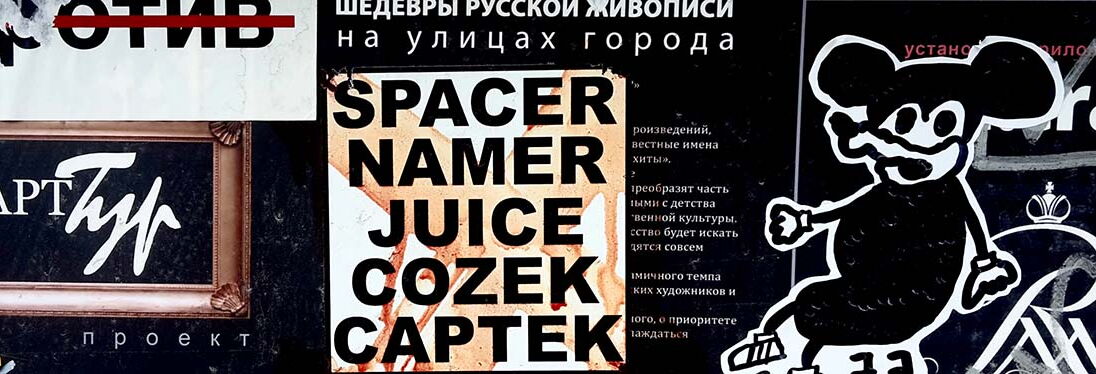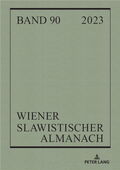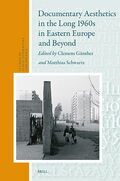
World Fiction, Post/Socialist. Eastern European Literatures and Cultures
The socialist project of creating a new world, fundamentally different from all previous ones and the capitalist in particular, was not restricted to the political and economic sphere. What is more, it aimed to revolutionize people’s relationships to each other and to their surroundings. The many different ways in which literature and popular art forms create fictional worlds are particularly well-equipped to observe what became of those goals and how their failure lives on in the cultures of Eastern Europe to this day.
Various projects investigate the complexities and ambivalences of these world fictions from a growing historical distance, overcoming the Cold War dichotomies of state repression and dissidence, totalitarianism and democracy, and official and unofficial art. Exploring how the past is continuously reinterpreted and reappropriated in the post-socialist present—ranging from Manichean demonization to nostalgic glorification— these projects’ aim is to expand and revise common readings of aesthetic practices, artistic methods, popular genres, and cultural conceptions of the world in historical and comparative perspectives.
A product of collaboration with various colleagues, one project examines, for example, how documentary aesthetics in the 1960s radically altered the ways in which artists accessed reality, another how, in the production of socialist masculinities, bourgeois gender relations were disrupted. Using travel literature as yet another example, one can trace the emergence of new notions of the global in the postwar period. Drawing on post-socialist representations of history, one can explore how globalized cultures of memory and social media radically disrupt conceptions of the past. Post/socialist world fiction thus negotiates two issues: the political fiction of a better world, increasingly becoming a fantasy estranged from reality, and the artistic production of divergent world concepts that articulate both fascination with everyday life and the horrors of it.
Fig. above: © Matthias Schwartz
see also
- Affective Realism. Contemporary Eastern European Literatures (Matthias Schwartz, project 2017–2019)
Publications
Jenseits der Nostalgie? Neuaneignungen des Spätsozialismus in osteuropäischen Gegenwartskulturen
Themenschwerpunkt des Wiener Slawistischen Almanachs
Documentary Aesthetics in the Long 1960s in Eastern Europe and Beyond
Matthias Schwartz
- Sowjetische Perspektiven unzensiert. Über Wassili Grossmans Roman “Stalingrad,” in: Zeithistorische Forschungen 21.2 (2024–2025), 375–386
- Review of: Paweł Zajas: “Das Polenbuch!”. Polnische Literatur und deutsche Kulturpolitik im 20. Jahrhundert. Wiesbaden: Harrassowitz 2023, in: sehepunkte 25.6 (2025)
- Introduction: Firsthand Time, in: Clemens Günther, Matthias Schwartz (eds.): Documentary Aesthetics in the Long 1960s in Eastern Europe and Beyond. Leiden: Brill 2024, 1–28
- The Technique of Documenting: on the Early Reportages of Ryszard Kapuściński and Hanna Krall, in: ibid., 164–185
- Das Ende der Nachkriegszeit. Aleksandr Prochanov und die spätsowjetischen Konzeptionen einer globalen Weltliteratur, in: Weimarer Beiträge 3 (2023), 427–454
- Klogestank und Klubarbeit. Zum Versprechen und Nachleben sozialistischer Kulturpaläste, Humboldtforum, 28 Sep 2023
- Generation Nothing and Beyond: Childhood and Youth in Contemporary Russian Literature, in: Marina Balina, Larissa Rudova, Anastasia Kostetskaya (eds.): Historical and Cultural Transformations of Russian Childhood: Myths and Realities. New York: Routledge 2022, 238–256
- Wenn eine Epoche beerdigt wird. Gedichte Anna Achmatovas zum Krieg (Auf den Seiten alter sowjetischer Zeitschriften), in: Mitropa 2021|22, 102–105
- Mikrokosmos, in: leibniz 21: Universum, 26 May 2023 (with Dirk Naguschewski)
- “Diener des Volkes”. Eine TV-Serie zwischen satirischer Fiktion und politischer Realität, in: INDES – Zeitschrift für Politik und Gesellschaft 1–2 (2022), 70–75
- Das kosmische Zeitalter reloaded. Zur Renaissance der menschlichen Raumfahrt in Russland, in: ZfL BLOG, 26 Jan 2022
- Dem Wunschtraum entgegen. Kosmosbegeisterung in der Sowjetunion, in: Berliner Debatte Initial 32.4 (2021), 1–15
- Die Erfindung des Kosmos, in: leibniz 17: Räume, 30 Nov 2021
- “Ich habe getan, was ich konnte.” Zum literarischen Werk von Stanisław Lem, in: Dialog Forum, 15 Nov 2021
- Servants of the People. Populism, Nationalism, State-Building, and Virtual Reality in Contemporary Ukraine, in: Telos. Cricital Theory of the Contemporary 195 (2021), 65–81
- Eine Welt ist nicht genug. Imaginationen alternativer Welten in sozialistischer Science-Fiction, in: Johann Ev. Hafner, Lukas Struß (eds.): Strings, Sphären und SciFi. interdisziplinäre Zugänge zu alternativen Welten. Baden-Baden: Ergon 2021, 185–198
- Prosa der Verstörung. Zum 100. Geburtstag von Stanisław Lem, in: ZfL Blog, 2 Sep 2021
- Die Traurigkeit des Golems. Stanisław Lems Figuration posthumaner Intelligenz als Poetik der Erinnerung, in: Alexander Friedrich i.a. (eds.): Kosmos Stanisław Lem. Zivilisationspoetik, Wissenschaftsanalytik und Kulturphilosophie. Wiesbaden: Harrassowitz 2021, 43–72
- Abschied von einer Utopie. Mediale Inszenierungen der Raumfahrt in der russischen Gegenwartskultur, in: Tobias Haupts, Christian Pischel (eds.): Space Agency – Medien und Poetiken des Weltraums. Bielefeld: transcript 2021, 73–98
- Silberlöffel und andere Aborte. Marginalien zu Stanisław Lems Lokaltermin, in: Jacek Rzeszotnik (ed.): Ein Jahrhundert Lem. 1921–2021. Dresden: Neisse Verlag 2021, 121–140
Events
Matthias Schwartz: Sowjetische Science Fiction: Die “Wissenschaftliche Phantastik” (“Naučnaja Fantastika”) und die Eroberung des Kosmos
University of Potsdam, Institute of Slavic Studies, Am Neuen Palais 10, 14469 Potsdam
Matthias Schwartz: Utopie und Katastrophe. Weltraum- und Zukunftsvorstellungen in sowjetischer Science-Fiction
Aalen University, Audimax, room 133, Beethovenstraße 1, 73430 Aalen
Matthias Schwartz: Der Globale Süden und die sowjetische Literatur
Ettersberg Foundation, Jenaer Straße 4, 99425 Weimar
(Un)Safe Plurality: Ukraine and Beyond
Institute for East European Studies, Freie Universität Berlin, Garystr. 55, 14185 Berlin
Lifeworlds Beyond Dictatorship?
Leibniz-Zentrum für Literatur- und Kulturforschung, Eberhard-Lämmert-Saal, entrance Meierottostr. 8, 10719 Berlin
Matthias Schwartz: Titanische Leidenschaften, oder: Eine Milliarde Jahre vor dem Weltuntergang. Wie die Urzeit in die sowjetische Science-Fiction geriet
Ludwig-Maximilians-Universität München, Philologicum, Ludwigstraße 25, 80539 Munich
Rhetorik als Waffe – über Putins Reden als Mittel der Politik
Leibniz-Zentrum für Literatur- und Kulturforschung, Eberhard-Lämmert-Saal, entrance Meierottostr. 8, 10719 Berlin
Matthias Schwartz: Popiól i diament
Kino im DFF – Deutsches Filminstitut & Filmmuseum, Schaumainkai 41, 60596 Frankfurt am Main
War, Migration, Memory
Berliner Landeszentrale für politische Bildung, Hardenbergstraße 22–24, 10623 Berlin
Matthias Schwartz: Der ferne Regenbogen. Zukunftsvisionen und Kosmosutopien in sowjetischer Science Fiction und Publizistik
University of Bern, main building, HS101, Hochschulstrasse 4, 3012 Bern, Switzerland
Matthias Schwartz: Productive Misunderstandings. Stanisław Lem Discusses AI, Moral Imperatives, and Posthuman Worlds with Western Information Theoreticians (West Berlin, Freie Universität, September 1981)
Freie Universität Berlin, Habelschwerdter Allee 45, 14195 Berlin, room JK 28/208
Trauma und Gewalt in literarischer Reflexion
Dresden University of Technology
Matthias Schwartz: Superkraft und Zaubertrank für den Kommunismus. Fantastische Zukunftsvisionen und Energieressourcen in sowjetischer Science-Fiction
Freie Universität Berlin, Osteuropa-Institut, Garystr. 55, Hörsaal A
Palace Stories
Humboldt Forum, Schloßplatz, 10178 Berlin
Zukunftsperspektiven für die deutschsprachige Slavistik
Schloss Herrenhausen, Herrenhäuser Str. 5, 30419 Hannover
Anfisa Doroshenko, Tasha Arlova, Matthias Schwartz: Eastsplainers #5: Visual arts
University of Amsterdam, Binnengasthuisstraat 9, 1012 ZA Amsterdam, BG 3, Room VOX-POP
Matthias Schwartz: #IAmAClown. How Comedian Volodymyr Zelensky Became President Through Digital Media
Sofia University, Tzar Osvoboditel blvrd. 15, 1504 Sofia, Bulgaria
Matthias Schwartz: Everything Flows. On the Im/Possibilities of Socialist Jewish Literature after the War
University of Amsterdam (UvA), University Library, Singel 421-7, Amsterdam, Room C.1.13 (Belle van Zuylenzaal)
Christiane Körner, Matthias Schwartz, Heike Winkel: Thematic evening on Vasily Grossman’s novel “Stalingrad”
Museum Berlin-Karlshorst, Zwieseler Straße 4, 10318 Berlin
Decolonizing Ukrainian Studies
Leibniz-Zentrum für Literatur- und Kulturforschung, Schützenstr. 18, 10117 Berlin, Aufgang B, 3. Et.
Navigating Ukrainian Studies in Time of War
Zentrum für Osteuropa- und internationale Studien (ZOiS), Mohrenstraße 60, 10117 Berlin
Zwischen uns ist jetzt Krieg. Anna Melikova talks with Matthias Schwartz
KVOST – Kunstverein Ost, Leipziger Straße 47, 10117 Berlin
Matthias Schwartz: Fluchtversuche und Gegenwelten. Zur Genese und Funktion von Science Fiction im Sozialimus
Technische Universität Dresden, BSS Bürogebäude, Strehlener Str. 22, 24, 01069 Dresden
Matthias Schwartz: Ein vergessener Kosmos. Zur Geschichte und Aktualität (post)sozialistischer Science-Fiction-Filme aus Osteuropa
Filmtheater Schauburg, Königsbrücker Str. 55, 01099 Dresden
Matthias Schwartz: Schöne seltsame Sonderlinge. Männer in sowjetischer Science-Fiction
Seminar für Slavistik / Lotman-Institut für Russische Kultur, Ruhr-Universität Bochum, 44780 Bochum
Matthias Schwartz: CoHLIT 21 seminar
Erasmushuis, Blijde Inkomststraat 21, 3000 Leuven, Belgien
Matthias Schwartz: Der gestörte Plot der Science-Fiction
Seidlvilla, Nikolaiplatz 1b, 80802 München
Jelena Đureinović, Matthias Schwartz: Einfluss von Erinnerungskultur(en) und Geschichtspolitik heute am Beispiel des postsowjetischen und des postjugoslawischen Raums
online
Socialism’s Divergent Masculinities. Representations of Male Subjectivities in Soviet Constellations and Beyond
Leibniz-Zentrum für Literatur- und Kulturforschung, Schützenstr. 18, 10117 Berlin, Aufgang B, 3. Etage, Trajekte-Tagungsraum
Matthias Schwartz: Servants of the People. Populism, Entertainment and Conspiracy in Eastern European Popular Culture(s)
Tolhuistuin, IJpromenade 2, 1031 KT Amsterdam, Niederlande
The Red Globe. Writing the World in Eastern European Travel Literature of the Cold War
Leibniz-Zentrum für Literatur- und Kulturforschung, Schützenstr. 18, 10117 Berlin, Aufgang B, 3. Et.
Wenn Geschichte umgeschrieben wird: Ein Blick auf die Ukraine, Belarus und Russland
Zentrum für Osteuropa- und internationale Studien (ZOiS), Mohrenstraße 60, 10117 Berlin
CoHLIT-21 Berlin Seminar on German Literature and the Holocaust
Leibniz-Zentrum für Literatur- und Kulturforschung, Schützenstr. 18, 10117 Berlin, Aufgang B, 3. Et. / online
Matthias Schwartz: Der Weg zu den Sternen. Zukunftsvisionen in sozialistischer Science-Fiction
Museum für Kommunikation, Leipziger Str. 16, 10117 Berlin
Matthias Schwartz, Clemens Günther: Die erste und zweite Welle des Dokumentarischen: Von der “literatura fakta” zur “dokumentarischen Mode”
Europa-Universität Viadrina, Große Scharrnstraße 59, 15230 Frankfurt (Oder), Raum HG 162
Panels with Matthias Schwartz at the 53rd Annual Conference of the ASEEES
New Orleans, LA, USA
“ewig her und gar nicht wahr.” Reading and talk with Marina Frenk
Leibniz-Zentrum für Literatur- und Kulturforschung, Schützenstr. 18, 10117 Berlin, Aufgang B, 3. Etage, Trajekteraum
Beyond Nostalgia. New Appropriations of Late Socialism in Contemporary Eastern European Cultures
Leibniz-Zentrum für Literatur- und Kulturforschung, Schützenstr. 18, 10117 Berlin, Aufgang B, 3. Etage
Opening of the exhibition “Stanisław Lem – ein polnisch-jüdischer Science-Fiction-Autor und sein universelles Werk” with Matthias Schwartz
vhs, Bergheimer Str. 76, 69115 Heidelberg
Matthias Schwartz: “Diener des Volkes”. Populärkulturen und Populismus im digitalen Zeitalter
online
“Explosive Convergences. Popular Memory Images in Current Political Conflicts (Belarus, Lithuania, Ukraine, Poland)” (Panel with Matthias Schwartz a.o.)
online
Matthias Schwartz: Ich, Du, Er, Sie: Populismus, Nationalismus und die postsozialistische Filmkomödie
Online
Wenn die Geschichte die Literatur einholt (workshop with Matthias Schwartz and Viktor Martinowitsch)
online via Zoom
‘Firsthand Time.’ Documentary Aesthetics in the Long 1960s
ZfL, Schützenstr. 18, 10117 Berlin, Aufgang B, 3. Etage, Seminarraum
Contributions
2 Feb 2023 Video
“Grossmans ‘Stalingrad’ (wieder) lesen. Geschichte, Übersetzung und Rezeption eines Jahrhundertromans”
Reading and discussion at Museum Berlin-Karslhorst with Christiane Körner (Frankfurt a.M.), Matthias Schwartz (ZfL) und Heike Winkel (Volksbund Deutsche Kriegsgräberfürsorge)
© Museum Berlin-Karlshorst
18 Jan 2022 Audio
“Der Weg zu den Sternen. Zukunftsvisionen in sozialistischer Science-Fiction”
Lecture by Matthias Schwartz in the context of the exhibition “BACK TO FUTURE. Technikvisionen zwischen Fiktion und Realität” at the Museum für Kommunikation Berlin
© ZfL
27 May 2021 Video
“Wenn die Geschichte die Literatur einholt”
Virtual workshop of the ABDOS (Association of Libraries and Documentation Centers for East, East Central and Southeastern European Studies) with Matthias Schwartz and Viktor Martinowitsch as part of “Leipzig liest extra,” an event of Leipzig Book Fair
© ABDOS e.V.

